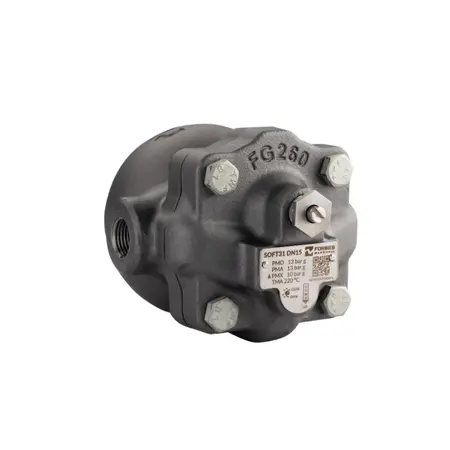Single Orifice Float Trap SOFT
Forbes Marshall Single Orifice Float Trap is a single orifice condensate drain trap and the first choice for process applications. The compact construction of these float traps combined with high discharge capacity ensures maximum heat transfer. Its unique features include a self-aligning main valve, water-hammer proof float assembly, and an integral, corrosion resistant air vent. All these along with the option of a steam lock release (SLR) mechanism make the Forbes Marshall single orifice float trap the most preferred ball float trap in the process industry.
- Effective condensate drainage
- No steam loss in normal working condition means a reduction in the carbon footprint.
- Erosion and impact resistant : Erosion deflectors with simplified flow paths make the trap erosion and impact resistant.
Variants
- Module with View Glass and without Disc Check Valve.
- Module with Disc Check Valve and without View Glass.
- Module without Disc Check Valve and without View Glass
- with built in Thermostatic Air Vent (TV)
- with built in Steam Lock Release (SLR)
- with built-in Steam Lock Release arrangement
Frequently Asked Questions
A single orifice float trap is commonly used in low-pressure steam systems, air-conditioning systems, and heating systems. These traps efficiently handle steady steam flow, ensuring condensate is discharged without allowing steam to escape. The design is particularly effective in systems with lower variations in pressure or load.
A steam lock mechanism is a feature in steam traps designed to prevent the formation of air pockets or blockages caused by steam. It ensures continuous condensate drainage by releasing trapped air, which can otherwise hinder the proper functioning of the trap. The mechanism operates by allowing air to escape before steam begins to flow, ensuring efficient operation and reducing the risk of steam blockage.
The steam lock mechanism ensures efficient condensate removal by preventing air pockets from obstructing the flow, reducing the risk of steam blockage, and maintaining consistent system pressure.

